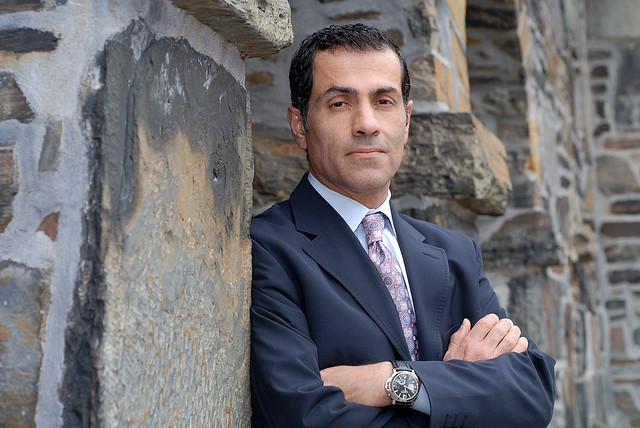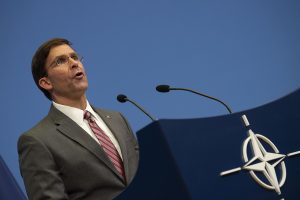by Robert E. Hunter
Publication this month of Vali Nasr’s The Dispensable Nation: American Foreign Policy in Retreat, could not have been better timed. The US and the NATO allies are in the process of disengaging from Afghanistan — however they choose to describe the process — without first developing clarity about what comes next and how to understand or secure the West’s continuing interests there or in the region. The Syrian civil war continues, seemingly without end and without success so far in the US government to develop a coherent policy or, apparently, efforts to fit that conflagration within developments in the region as a whole. President Obama has just visited the Near East, but there is as yet no promise that serious negotiations between Israelis and Palestinians will begin anytime soon. The standoff with Iran and its nuclear program continues. And there are widespread doubts about the staying-power of US commitments and policies throughout the Middle East and Southwest Asia. For some observers, including Nasr, all this leads to serious questioning about the overall conduct of American foreign policy, summarized in his judgment: “retreat.”
The author, now Dean of the School of Advanced International Studies at Johns Hopkins University in Washington, has had a special vantage point. From January 2009 until 2011 Nasr was special advisor to Ambassador Richard Holbrooke (who died in December 2010), who was the President’s (and Secretary of State Hillary Clinton’s) Special Representative for Afghanistan and Pakistan — shortened to the more digestible “AfPak.” It is not too much to say that Dr. Nasr’s brief but intense experience in the US government at a high level was both disappointing and disillusioning — and he was not alone. His principal conclusion, at least as inferred by this reviewer, is that the Obama White House failed to take seriously the diplomatic opportunities that were afforded the US, not just toward AfPak, but in the region overall; that it continued to tolerate an excessive militarization of US policies begun by earlier administrations at the expense of a more integrated approach where diplomatic instruments could play their proper role; that the president himself was long on language — eloquently so — but short on action and in the process failed to come to grips with a number of regional developments; that the best efforts by the State Department, including by Secretary Clinton, to intervene in critical policy-making were too often either rebuffed or ignored; and that the US has failed in its essential leadership role. Indeed, the title of Nasr’s book, Dispensable Nation, is a play on a term first coined by Secretary of State Madeleine Albright to the effect that the US in the post-Cold War world remains the “indispensable nation.”
(Nasr also does valuable service by eviscerating the case made for sanctions and yet more sanctions against Iran in order to get it to do what we want on its nuclear program, as well as on other matters, including the sub-rosa effort undertaken by the US, Israel and Saudi Arabia to eliminate Iran completely as a competitor for influence in the Middle East. However, the author’s insight comes at a price. His need to paint a dark picture of Iranian ambitions for the bomb and for regional hegemony, coupled with his shredding of the case for sanctions, leaves one wondering whether there is any alternative to war.
On China Nasr provides valuable service by alerting us to the fact that it — like often neglected countries such as Russia — also has major ambitions in Southwest Asia and parts of the Middle East. But he over-interprets available evidence, draws too many connections by linking murky data and too readily assumes that there will inevitably be contention, if not open confrontation, between the US and China.)
What Nasr says about the way in which the White House controlled foreign policy in Obama’s first term and made it highly subservient to domestic politics, at times thereby neglecting critical foreign interests, is a damning indictment – even if only partly true, and at this point in history, no outsider can judge. Nasr is not the only one to argue a similar thesis, but it is the first to be made, as far as this reviewer is aware, by someone as intimately involved in at least one major element of US policy implementation. This helps to explain why a book that has not yet hit bookstores has gained so much attention, apart from the usual Washington parlor game of welcoming “kiss and tell,” merged with a desire to see whoever the sitting president is stub his toe or worse. On all of this, Dispensable Nation delivers. It is a compelling read, even though it occasionally gets bogged down in detailed analyses of issues which most people will know little about. And while Nasr cannot be counted as a member of the new cottage industry of “declinists,” he does warn that, without a radical rethinking about the making and carrying out of US foreign policy, this nation can do itself and its role in the world serious injury, not least to its reputation and to the willingness of others to rely on it.
So far, so good. But there are some other facets of this book, which, while not reducing the author’s valuable insights listed above, at least present a somewhat different perspective. One might be a quibble on the part of an “old school” approach to government service: that someone who voluntarily “takes the King’s shilling” implicitly assumes a burden of not telling tales out of school, at least not until all the senior players have left the stage. Of course, breaking with that unwritten practice makes for a juicier read, but also leads one to ponder.
A more serious question is raised by the apparent assumption running throughout the book that, if a different approach had been taken to X or Y — in particular a greater reliance on diplomacy and giving free rein to diplomatic approaches advanced by the Special Representative, Ambassador Holbrooke (who appears in Dispensable Nation to have been the lead character of an “inside the Beltway” morality play), then very different, positive things would have resulted. This would be a reach in regard to any region of the world. With regard to the Middle East and its long history of complexities and imponderables — more even than what Winston Churchill said of Soviet foreign policy, “a puzzle inside a riddle wrapped in an enigma” — one should be chary of drawing hard-and-fast conclusions about the impact of different policies that might have been pursued. Thus, it is difficult to believe that, without other major factors changing, US leadership would on its own somehow have transformed Arab-Israeli peacemaking; that a different US approach to Egypt and other Arab countries would have produced a better course for the Arab Spring; that earlier intervention (but exactly what?) would have ended the slaughter in Syria; and that the negotiating strategy advocated by Ambassador Holbrooke would have brought the Afghanistan war to a successful conclusion (without taking us all back to Square One with the Taliban again in full control) and with US-Pakistan relations on better footing and the region stabilized.
To summarize, in addition to the highly relevant and well-argued analysis of the Obama administration’s shortcomings, many of the author’s suggestions for alternative approaches are more wishful thinking than the product of deep knowledge about the region and seasoned judgment concerning the very real limits of power, however “powerful” the actor. Perhaps that is an unfair conclusion, given that Nasr’s role in AfPak was the his first venture into government, but that gives greater weight to the admonition about being careful with drawing needlelike conclusions and making sweeping predictions about alternative strategies and their putative outcomes.
It might also have been useful if Dr. Nasr had drawn upon his experience to discuss whether the practice of using special representatives instead of common and garden-variety diplomacy is a good or bad thing. In some cases, appointing a US special negotiator has had positive effects – like in Arab-Israeli peacemaking, where a special negotiator can relieve a Secretary of State from having to deal virtually full-time with demanding and quarrelsome partners; or lengthy arms control negotiations, where having at the table experts from outside the Foreign Service can be essential, as the Obama administration, in this reviewer’s judgment, has ably and effectively done. But other than these exceptional circumstances, substituting a special representative for the regular practices and processes of the US government is just asking for trouble. This was certainly true in regard to the plethora of special representatives appointed during the first Obama administration, thereby short-circuiting the regular workings of government so much so that the expertise and experience needed to formulate and implement effective policies were at times missing or sidelined. Certainly, the balancing of contending (and legitimate) points of view from different elements of the bureaucracy (e.g., state, defense, CIA, NSC staff) risked being lost, to the detriment of coherent policy that could be effectively integrated for the longer-term with other related US concerns abroad beyond the purview of the special representatives.
Add to this the appointment of a special representative for AfPak who had achieved almost superstar status, with personal ambitions to match and a well-deserved sobriquet of “bulldozer,” and it would be surprising if all had gone smoothly within the US government — not least because Amb. Holbrooke, the hero of Dispensable Nation, had no experience in the region and no prior knowledge of the issues or the local political cultures. Indeed, it did not go smoothly, predictably so given Amb. Holbrooke’s career-long disdain for anyone who got in his way (along with his methods for eliminating competitors for either position or limelight), his lack of capacity for genuine strategic thinking as opposed to short-term tactical fixes, and his most undiplomatic approach to friend and foe. In fact, since his highly publicized spat with Afghan President Hamid Karzai who, like it or not, is someone the US has had to deal with, Holbrooke’s role as an interlocutor ceased to be useful to the United States.
In sum, Nasr has not only given us a good read but also a former insider’s judgments about what happens when a US administration does not place a high enough priority on getting right the US role in the world; does not assess adequately what it truly needs to do (instead of issuing slogans like “pivot to Asia” that confuse allies and imply reduced US interest in the Middle East and Southwest Asia at the very time when peril to American interests there is increasing); that inserts domestic political judgments at the start of the process instead of after due consideration of foreign policy choices; that permits a continuing imbalance between military and non-military instruments of power and influence; and that does not yet adequately “think strategically” about the future two decades after the end of the Cold War made such strategic thinking imperative.
Whether Dr. Nasr is right on both his analysis and his prescriptions will now be hotly debated. In any case, Dispensable Nation has emerged as valuable evidence supporting one important point of view.





